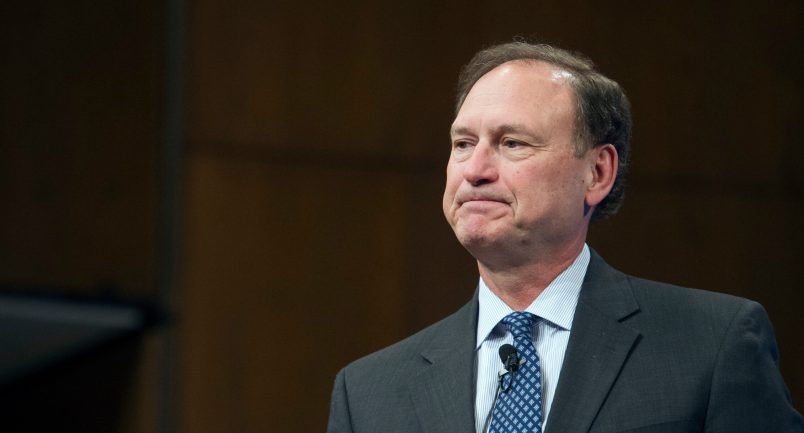The Supreme Court conservatives who refused to join Justices Neil Gorsuch, John Roberts and the court’s liberal wing to protect LGBT employees from workplace discrimination issued stinging dissents to Monday’s blockbuster ruling.
Justice Samuel Alito, joined by Justice Clarence Thomas, accused the majority of “[u]surping the constitutional authority of the other branches” and said that a “more brazen abuse of our authority to interpret statutes is hard to recall.”
Justice Brett Kavanaugh wrote his own dissent that likewise alleged a “transgression of the Constitution’s separation of power,” even as he felt the need “to acknowledge the important victory achieved today by gay and lesbian Americans.”
Gorsuch’s majority opinion concluded that the Civil Rights Act’s protections against sex discrimination covered workplace discrimination against employees for being gay or transgender. He framed his opinion as a textualist approach to the 1964 law. While acknowledging that the law’s drafters might not have envisioned the law being interpreted this way, Gorsuch said that the “limits of the drafters’ imagination supply no reason to ignore the law’s demands.”
Gorsuch quoted the late Justice Antonin Scalia, whose seat Gorsuch filled, in the opinion to explain why it did not matter that Congress, since the 1964 law, had attempted to pass measures outlawing LGBT discrimination.
Alito took several shots at Gorsuch for daring to invoke Scalia in the opinion.
He said “no one should be fooled” by Gorsuch’s “attempts to pass off” his approach to the one “championed” by Scalia .
Comparing Gorsuch’s opinion to a “a pirate ship,” Alito said it “sails under a textualist flag, but what it actually represents is a theory of statutory interpretation that Justice Scalia excoriated –the theory that courts should ‘update’ old statutes so that they better reflect the current values of society.”
“[N]o one should be taken in by the majority’s effort to enlist Justice Scalia in
its updating project,” Alito wrote.
Alito said it was “preposterous” that the majority was “merely enforcing the terms of the statute.”
“The arrogance of this argument is breathtaking,” Alito said.
His dissent compared the firing of an LGBT employee for being gay or transgender to the firing of an employee because his or her astrological sign.
“Even idiosyncratic criteria are permitted; if an employer thinks that Scorpios make bad employees, the employer can refuse to hire Scorpios,” Alito wrote. “Such a policy would be unfair and foolish, but under Title VII, it is permitted. And until Title VII is amended, so is a policy against employing gays, lesbians, or transgender individuals.”
Like Alito, Kavanaugh accused the majority of playing the role of Congress and the President. He claimed that in “judicially rewriting Title VII, the Court today cashiers an ongoing legislative process, at a time when a new law to prohibit sexual orientation discrimination was probably close at hand.”
He said that Gorsuch’s opinion “rewrites history.”
“Seneca Falls was not Stonewall. The women’s rights movement was not (and is not) the gay rights movement, although many people obviously support or participate in both. So to think that sexual orientation discrimination is just a form of sex discrimination is not just a mistake of language and psychology, but also a mistake of history and sociology,” Kavanaugh said.
He claimed that Gorsuch had adopted a “literalist” approach by interpreting the 1964 law’s sex discrimination prohibitions to be applicable to LGBT discrimination.
“Under this literalist approach, sexual orientation discrimination automatically qualifies as sex discrimination, and Title VII’s prohibition against sex discrimination therefore also prohibits sexual orientation discrimination—and actually has done so since 1964, unbeknownst to everyone. Surprisingly, the Court today buys into this approach,” Kavanaugh said.
He decried that Monday’s ruling was not a “hard-earned victory won through the democratic process,” but instead a “victory” by “judicial dictate—judges latching on to a novel form of living literalism to rewrite ordinary meaning and remake American law.”
“Under the Constitution and laws of the United States, this Court is the wrong body to change American law in that way,” he said.







I’m beginning to think Roberts is starting to see the light. Time will tell, but people do turn away from the dark side sometimes. I have hope for him.
Gorsuch said that the “limits of the drafters’ imagination supply no reason to ignore the law’s demands.”
That is the best argument against “originalism” I have ever heard. Can we apply that to the second amendment?
Alito might want to keep a blood pressure cuff nearby.
He could be next.
Kavanaugh is not intellectually qualified to be on the court. Dude writes like a sophomore.
Ugh, it’s not that the majority is “rewriting history”, it’s that modern cultural values are finally enabling the humans who adjudicate legal disputes (i.e. judges) to call a spade a spade.